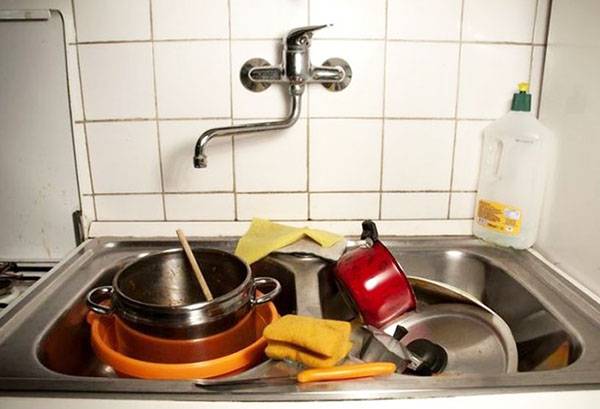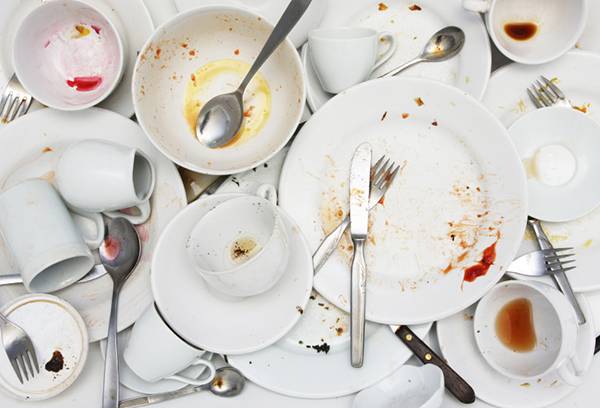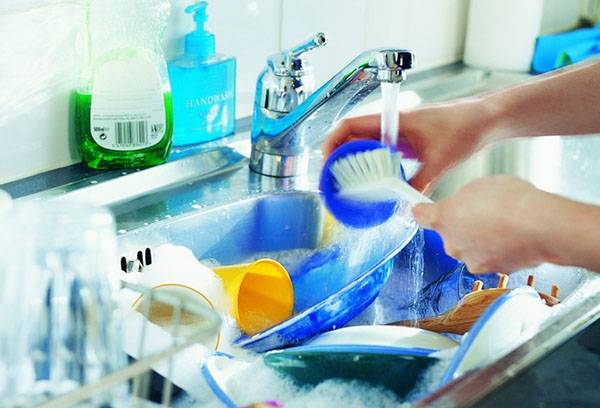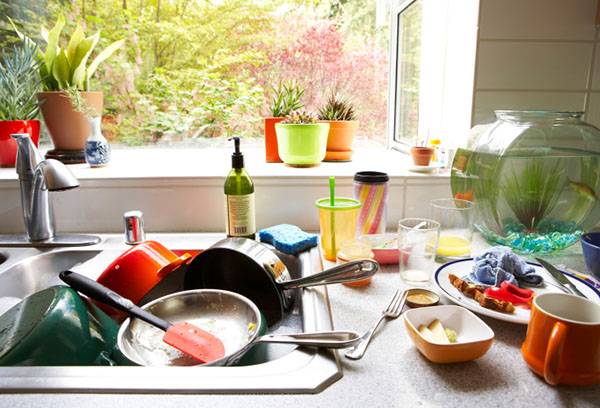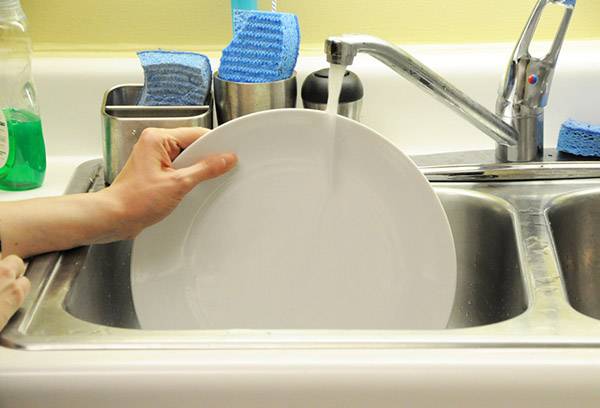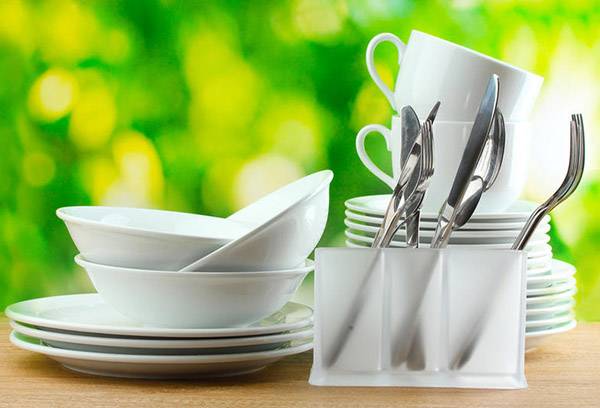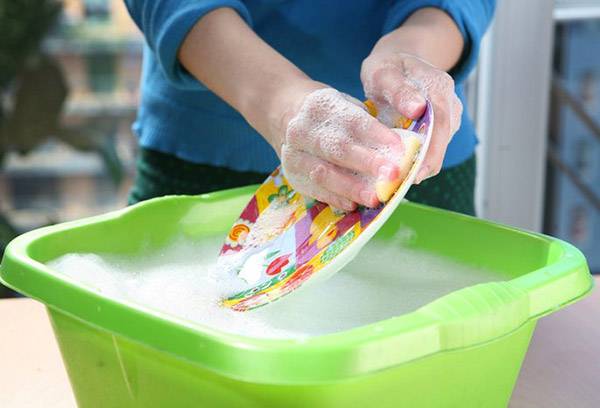All the secrets of washing dishes without harm to women's hands and mood
Content:
The process of washing dishes is very tedious. In order to facilitate your work, you need to know how to wash the dishes correctly. Oddly enough this sounds, but even such ordinary homework can raise a number of questions and doubts. For example:
- how to wash dishes from delicate and fragile materials;
- what detergents are safer to use;
- how to get rid of burnt fat quickly and effectively;
- how to clean table silver in a few minutes;
- Is it possible to do without household chemicals.
Let's try to answer these and other questions, as well as the basic rules for washing dishes.
Where to begin?
If you do not belong to the category of happy owners of dishwashers, you will have to do unpleasant work with your own hands.
To wash the mountain of accumulated dirty dishes, you need to prepare everything you need.
- Military equipment: apron and gloves.
- Tools: all kinds of sponges, rags, brushes, metal washcloths, brushes.
- Household chemicals for the destruction of fat, old plaque, dried food: cleaning pastes and powders, detergents in the form of a gel, soap solution.
- Of course, hot water is required. If not, use funds that effectively eliminate fat in cold water. You can also heat the water in a saucepan.
- And, of course, prepare a place where "military operations" will take place: it will be a normal wash if you are at home, or a basin (you can bucket) if you are in the country or relax in a tent in nature.
Important!
Whatever you use to wash the dishes, remember: all the achievements of synthetic chemistry in the form of powders, pastes and gels are unsafe for health. Only a thorough reusable rinse can guarantee a complete cleansing of the dishes from harmful substances contained in cleaning solutions.
When choosing a dishwashing detergent, be guided by such indicators as:
- reasonable value for money;
- wide scope;
- fat elimination effectiveness;
- speed of cleansing from stubborn dirt;
- the degree of safety of household chemicals for the skin of the hands and for the body as a whole (in the case of the remnants of a poorly washed product and food entering the stomach)
Sort the dishes
How to quickly wash the dishes? Before starting your “favorite” activity, spend a few minutes sorting existing contaminated items: spoons to spoons, forks to forks, a separate pile for plates, cups and glasses. In addition, you can arrange the dishes according to the degree of contamination: in one pile devices with a lot of fat, in the other - "fat-free". It is better to wash each stack separately, without mixing items from one pile with items from another. For example, start washing small objects (spoons, knives, forks), then mugs, then plates, and at the very end proceed to the “heavy artillery”, which always has a lot of grease and other impurities - such as pans, pans, baking trays, ducklings, etc. . If you adhere to this recommendation, you can slightly reduce the time spent on washing dishes. How?
- Firstly, the orderly process of washing the cutlery will help in the right order to quickly put in their places all the washed items, without creating confusion.
- Secondly, the hands perform the same type of action much faster. For example, if you first wash only the forks, and then switch exclusively to plates.In a situation where you want to wash the plug first, then the glass, then the fork or spoon again, and then suddenly the plate, do not wait for an instant muscle reaction from your hands: in order to change from one action to another, the muscles need a certain amount of time.
- Thirdly, it is better to start with dishes on which there is no fat; it is easier and faster to wash it. In addition, she will not have time to get dirty even more from other, more soiled plates.
Create mood
The festive feast is behind, the guests dispersed, and you think, how do you force yourself to do what you should? How to wash dried oily dishes?
- Let the dishwashing detergent be pleasant in color and fragrant.
- Take the new sponge you just bought and discard the old one mercilessly.
- Do not save on household chemicals: let there be a lot of foam, so washing is more pleasant and effective, and therefore faster.
- Finally, turn on your favorite music or program.
Use any means to raise your mood, lethargy and apathy will slow down the whole thing.
Don't procrastinate
One of the answers to the question of how to wash dishes is right after eating. Fresh food leftovers are easier and faster to clean without waiting for them to dry. Having accustomed yourself to washing the dishes immediately, while they are still a little, you will not be wasting time and effort later, sorting out the whole mountains of accumulated dried and badly smelling tableware.
Such a habit will save you from the unpleasant feeling of unfulfilled homework, which will be a heavy burden to hang over you all day and poison your mood.
When for some reason it is not possible to immediately wash the dishes, soak them in hot water. Then a slight movement with a sponge will be enough to remove all unnecessary from a plate or mug.
What needs to be washed only with cold water?
Products made of crystal and porcelain are washed in cool water, otherwise they may fade and lose their strength over time.
How to quickly wash the dishes if there are traces of dough, eggs, cottage cheese, kefir or milk on it? Do not use hot water. This will lead to the fact that the proteins contained in these products, brew from exposure to high temperatures and dry to the plates even more. In this case, first wash the dishes with cold water, and then pour hot.
Some useful tips for a good housewife
- To remove the smell of onions, garlic or herring from cutlery, rinse them with vinegar.
- Plates and mugs with drawings should not be rubbed with anything hard or washed in very hot water so as not to damage the image.
- To separate the glasses stuck in one, you can do this: in the glass inside, pour hot water, and in the one outside - cool.
- Products made of cast iron and iron must be well dried so that rust does not form.
- Aluminum dishes are not washed with the product in which there is acid.
- Enameled utensils should not be processed with hard brushes or metal mesh washcloths, do not allow impact, scratches or other damage. All this can lead to cracking.
- To add shine to porcelain, glass and crystal products, vinegar and salt are used (add 1 teaspoon of vinegar and salt to one liter of water). Rinse dishes, rinse and wipe with a dry linen towel.
- The dark coating on the inner walls of the brewing kettle can be removed as follows: leave the teapot filled with soda solution (200 ml of water plus a teaspoon of soda) at night.
- How to remove the sediment in a vase, which appeared from the long standing flowers in it? Prepare a solution: one teaspoon of acetic acid is diluted with a liter of water. This solution will cope well with such pollution.
Washing dishes with alternative means: clean and safe
How to wash dishes by hand without using harmful chemicals? There are many unconventional folk methods. Consider the most common of them.
- Dry mustard is suitable as a cleaning powder, and as a component of an aqueous solution or cleaning paste. You can add a little vinegar.
- Baking soda is also good, but it can scratch special coatings.
- Soda ash is useful in the form of an aqueous solution or paste. If you wash the dishes with this product by hand, it is better to use gloves.
- The use of the old grandmother's method of washing dishes with wood ash is relevant to this day. Ash is extracted from village stoves or fireplaces.
- The sand is good in hiking conditions on a tourist vacation in the forest. It perfectly cleans all dirt, but can scratch delicate items.
- Salt will cope well with burnt greasy food debris, and will qualitatively wash glass.
- You can use tooth powder to remove plaque on spoons, especially from tea and coffee; This tool is also suitable for cleaning silver dishes.
Take care of dishes, as well as your time and energy, do your homework correctly and on time!
